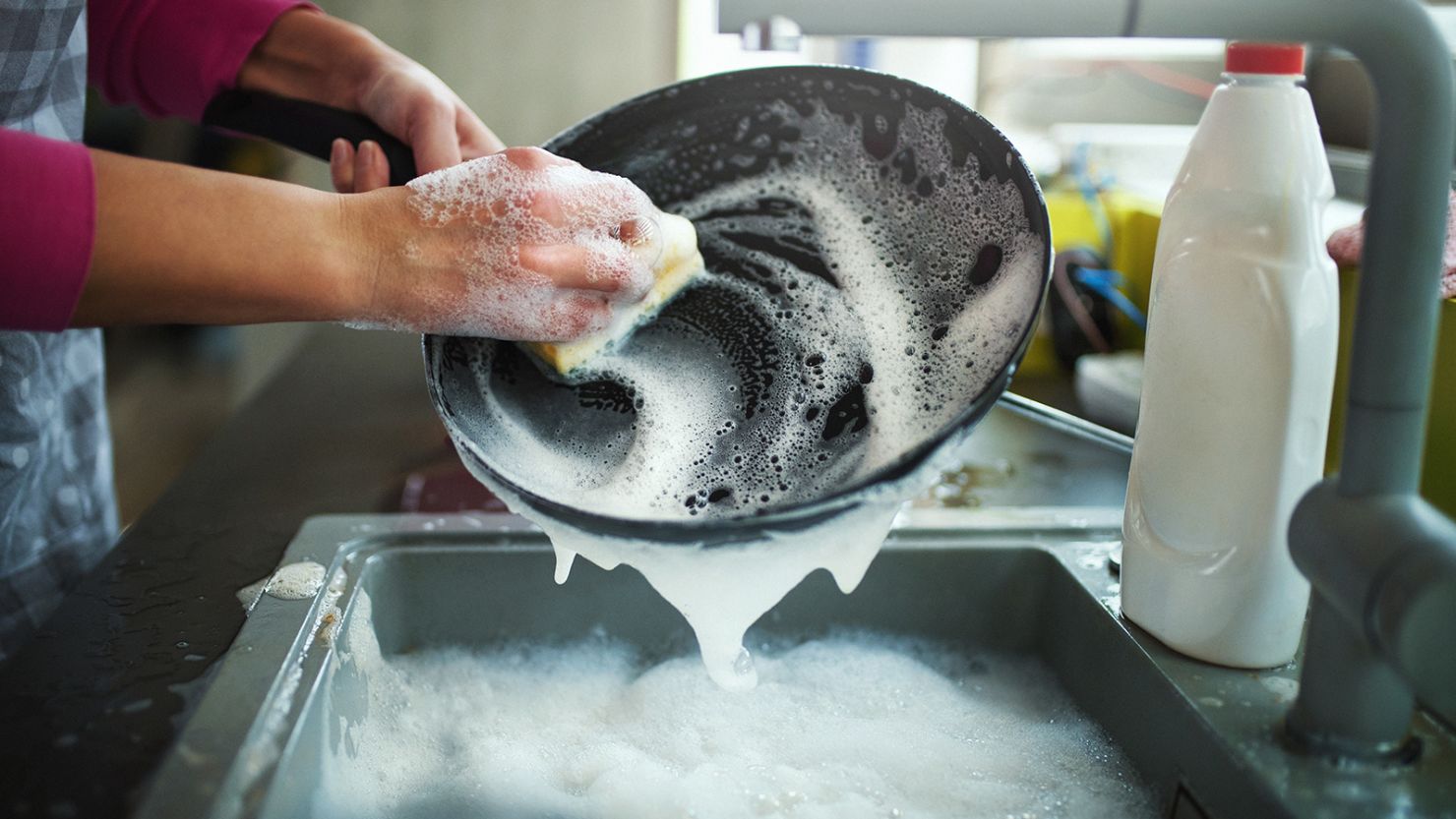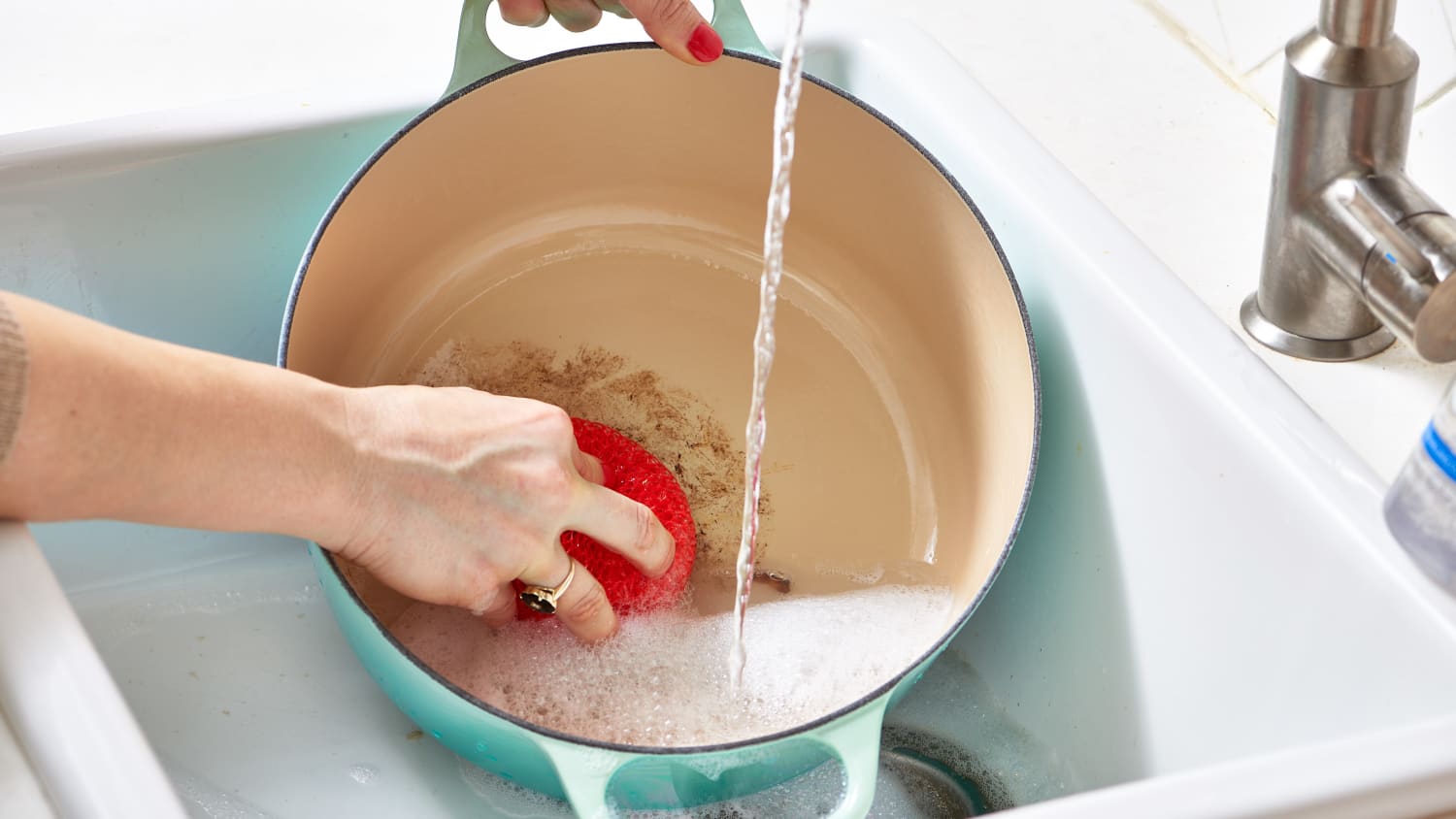I prefer washing dishes by machine for its convenience and efficiency. Manual washing can be therapeutic but is often more time-consuming.
Deciding between machine washing and hand washing dishes largely depends on individual preferences and circumstances. Dishwashers offer a convenient, hands-off cleaning experience, saving time and potentially reducing water usage compared to hand washing. They are perfect for busy lifestyles and large households where the accumulation of dishes is constant.
On the other hand, some people find the task of hand washing dishes to be a mindful activity that allows for immediate control over the cleanliness of each item. It’s also the go-to option in situations lacking a dishwasher or when dealing with delicate items that machines might damage. Choosing the best method involves considering factors like efficiency, environmental impact, and personal satisfaction.
Table of Contents
Dishwashing: A Daily Chore
Imagine a kitchen with a stack of utensils towering by the sink. We’ve all been there, facing the dreaded task of dishwashing. Whether after a hearty meal with family or a quick snack, dishes are an inevitable part of daily life. Some opt for the convenience of machines, while others stick to the traditional scrub and rinse. Let’s dive into what makes this chore a significant part of our routine.
The Routine Task
Dishwashing is a task most can’t escape. It can be soothing for some and a nuisance for others.
- A clear sink provides a sense of accomplishment.
- A dirty kitchen can increase stress.
- Regular washing avoids pile-up.
For those who favor machines, the steps are simple:
- Rinse dishes of food scraps.
- Load the dishwasher.
- Add detergent and start the cycle.
Hand-washing enthusiasts, on the other hand, follow a more hands-on approach:
- Fill the sink with warm soapy water.
- Scrub dishes with a sponge or brush.
- Rinse off the suds and air dry or towel off.
Impact On Daily Life
Dishwashing’s influence is subtle yet significant. The method chosen can affect time, effort, and even water usage.
Machine Washing | Hand Washing | |
|---|---|---|
Time Spent | Minimal. Load and forget. | Varies. Depends on quantity. |
Effort | Low. Machine does the work. | Moderate to High. Requires scrubbing. |
Water Usage | Can be economical with newer models. | Often higher but controllable by user. |
Consistent dishwashing ensures:
- A tidy kitchen space.
- Ready-to-use utensils at all times.
- Prevention of pest infestations.
Remember, the choice between machine or hand washing is personal. Each method has its perks and impacts how we navigate our daily lives.
Machine Vs. Hand Wash
Deciding between machine and hand washing dishes is a daily debate in many households. Some favor the modern convenience of a dishwasher, while others stick to the traditional sink, sponge, and soap method. Each choice has its own merits, and often the decision comes down to personal preference, environmental impact, and the specifics of the items in need of cleaning.
Contrasting Methods
The dishwasher shines in efficiency and ease. Place dishes inside, add detergent, and it does the rest. Its high-temperature cycle can kill more germs and bacteria compared to hand washing. Yet, the dishwasher may use more electricity and water, depending on the model.
Hand washing, on the other hand, offers a gentler clean for delicate items. It allows for immediate use of dishes and may conserve water if done efficiently. But it can be more time-consuming and physically demanding.
Method | Pros | Cons |
|---|---|---|
Dishwasher | Time-savingSanitizes wellConvenient | Higher utility usageNot for all dish types |
Hand Washing | Control over cleaningWater conservation potentialNo electricity required | Time-intensivePhysically tiring |
Personal Preferences
Your choice may hinge on your lifestyle. Busy people might prefer the set-and-forget routine of a dishwasher. Those who enjoy mindfulness might find hand washing therapeutic. Families with lots of dirty dishes may lean towards the practicality of a dishwasher. Singles or couples might opt for hand washing to save on utilities.
Ultimately, the decision intertwines with your values. Some prioritize environmental concerns, selecting the method that uses the least resources. Others may choose based on the care needed for their dishes. Consider your daily routine and choose what suits you best.
The Allure Of Dishwashers
Imagine a kitchen where sparkling dishes pile up without effort. Dishwashers bring this dream to life. They offer a hands-off approach to a chore many would rather avoid. In the dance of kitchen appliances, dishwashers take center stage, beckoning with the promise of cleanliness and convenience. Let’s dive into the enchanting world of dishwashers and explore their benefits.
Time Efficiency
Time is precious, and dishwashers understand this well. They allow you to multitask with ease. Load the machine, press start, and turn your attention to more enjoyable activities. You can save hours each week—time better spent with family or indulging in personal hobbies.
Sanitization Levels
Hygiene takes the forefront in any kitchen. Dishwashers excel in this domain by using high temperatures to kill germs and bacteria. These temperatures are often higher than what hands can withstand, ensuring a deeper level of dish sanitation.
Energy And Water Usage
Modern dishwashers are champions of environmental efficiency. They use less water than traditional hand washing and are designed to save energy. Below is a comparison illustrating the efficiency of dishwashers:
Method | Water Used | Energy Consumption |
|---|---|---|
Hand Washing | 27 gallons | 2.5 kWh |
Dishwasher | 3 gallons | 1.5 kWh |
Choose dishwashers for a blend of convenience, sanitation, and efficiency. These machines turn a mundane task into a subtle art of time management and cleanliness.
Tradition Of Hand Washing
There is something timeless about washing dishes by hand. Many families pass down this tradition. It connects us to simpler times. Masters of their kitchens often choose the touch, the feel, and the careful attention of hand washing. Let’s delve into the perks of this age-old method.
Hands-on Approach
Every dish receives personal care. You ensure that each plate, cup, and utensil is spotless. This direct method beats machines in detail and thoroughness. You can scour every nook and cranny. Machines sometimes miss spots. With your hands, you don’t.
Control Over Cleaning
Do you have delicate china or hefty pots? Hand washing lets you adjust your technique. You decide the pressure and the cleaning agent for each item. This way, you protect fragile items and scrub the sturdy ones harder. Machines may damage delicate wares with their vigorous cycles.
Sensory Satisfaction
- The warm water, soothing.
- The bubbles, mesmerizing.
- The squeaky clean sound, gratifying.
There’s a zen-like joy in hand washing. You feel the temperature, soap, and textures. It’s therapeutic, calming. Many find this sensory experience a rewarding end to a meal.
Environmental Concerns
Choosing between washing dishes by hand or machine is not just about saving time. It’s about the health of our planet too. Let’s dive into the environmental impacts of both methods.
Eco-footprint Of Machines
Dishwashers have come a long way in terms of efficiency. Modern machines use less water and energy than washing by hand. However, the eco-footprint of machines is not just about operation. It includes manufacturing and disposal too.
Aspect | Impact |
|---|---|
Water Use | Modern dishwashers use around 9-12 liters per cycle. |
Energy Consumption | Energy Star-rated dishwashers can save up to 4,000 gallons of water over their lifetime. |
Chemical Use | Choosing eco-friendly detergents can help reduce harmful chemicals. |
Sustainable Practices In Hand Washing
Many believe hand washing is kinder to the Earth. But it can waste more water if not done correctly. Sustainable practices can change this.
- Fill one sink with soapy water and another with clean water for rinsing.
- Turn off the tap while scrubbing dishes.
- Use biodegradable soap to minimize chemical release.
By improving how we hand wash, we contribute to a greener planet. Compare this to a machine’s life cycle—you might be surprised which is more eco-friendly.
Economical Aspects
Let’s dive into the economical aspects of washing dishes. Many people debate over hand washing versus using a dishwasher. Money plays a big part in this decision. We’ll explore costs to buy and run a dishwasher compared to washing by hand.
Upfront And Ongoing Costs
Buying a dishwasher needs a chunk of money up front. You might spend $400 to $700 for a good one. Don’t forget about installation fees. They can add $100 to $200 to the total.
Dishwashers also use water, electricity, and detergent. Running a dishwasher can cost around $0.05 to $0.07 per cycle for power. Plus, water costs vary, but average out to less than $0.15 per cycle.
Item | Cost |
|---|---|
Dishwasher Purchase | $400 – $700 |
Installation | $100 – $200 |
Electricity per Cycle | $0.05 – $0.07 |
Water per Cycle | < $0.15 |
Hand washing dishes only needs soap and scrubbers. This can be under $1 per week depending on your dish load.
Long-term Savings
A dishwasher can beat hand washing in the long run. New dishwashers save more water and power. They keep utility bills down. If you use it wisely, it might pay for itself over the years.
- Energy-efficient models cut costs more.
- Using cold water cycles saves energy.
- Washing full loads makes each cycle cost-effective.
By contrast, hand washing uses more water per dish.
A study shows an efficient dishwasher can save 5,000 gallons of water each year. It reduces the annual water bill by about $35.
So, the right dishwasher might save money after all!
Psychological Effects
Exploring the psychological effects of washing dishes offers insight into how this everyday task can impact your well-being.
Therapeutic Qualities Of Hand Washing
Many find tranquility in the simple act of hand washing dishes. The warm water, the formation of bubbles, and the methodical scrubbing can create a meditative state. This process allows for mental decluttering, as repetitive motions encourage mindfulness and present moment awareness.
Hand washing dishes can be a form of stress relief. It focuses the mind and calms the senses. This calming effect stems from the tactile experience and the satisfaction of completing a task, which boosts happy hormones like dopamine.
- Reduction in anxiety levels
- Increased feelings of accomplishment
- Sense of control over one’s environment
Stress Of Clutter
On the flip side, a sink full of dirty dishes can create a sense of chaos. This visual clutter induces stress, which can disrupt emotional balance and increase feelings of overwhelm.
Clearing the sink and cleaning dishes, whether by hand or machine, can restore order and generate a peaceful, clutter-free space. A tidy environment promotes relaxation and helps maintain focused, productive mental states.
Issue | Effect | Solution |
|---|---|---|
Visual clutter | Increases stress | Wash dishes regularly |
Sink pile-up | Heightens anxiety | Maintain tidy space |
Maintaining a routine that includes washing dishes can also foster a sense of accomplishment. This practice impacts daily well-being, offering both psychological benefits and a cleaner kitchen.

Credit: www.amazon.com
Cultural Perspectives
Cultural Perspectives on dishwashing vary across the globe. The debate between machine and hand washing spans diverse societies. Our customs often guide our choices in the kitchen. In this section, we explore the rich tapestry of traditions determining how dishes clink and clatter in the sink or hum in the dishwasher.
Different Practices Around The Globe
In some cultures, dishwashers may seem like an unnecessary luxury. For example, in India, many households regard hand washing as an integral part of their daily lives. From soap bars to specific brushes, every tool has its place at the sink.
In contrast, those in Sweden enjoy the convenience of a dishwasher. For them, it’s not just about saving time. It’s also about conserving water. Scandinavian societies prize ecological sustainability, often translating to pro-machine choices.
Let’s look at how these practices vary around the world:
Country | Preferred Method | Reason |
|---|---|---|
Japan | Hand Washing | Aesthetic Ritual |
Germany | Machine Washing | Efficiency |
Brazil | Hand Washing | Family Bonding |
Passing Down Traditions
Within families, dishwashing techniques often become treasured traditions. Parents teach children the nuances of scrubbing pots and the rhythm of rinsing. These moments turn simple chores into memory-making activities.
- In Italy, families often gather after meals to chat over the sink.
- Japanese parents introduce precise hand washing techniques early on.
- In the United States, children might learn dishwashing as their first household task.
These rituals are more than just cleaning methods. They strengthen bonds and preserve cultural heritage. Whether passing down the perfect scrubbing motion or how to load a dishwasher efficiently, these practices live on through generations.
Innovations In Dish Cleaning
Revolutionizing the way we clean our dishes, recent technological and design advancements have both simplified and enhanced this everyday task. Whether one opts for machines or manual labor, these innovations promise to make dishwashing more efficient and less tedious.
Modern Dishwashers
Today’s dishwashers are marvels of engineering, aimed at saving time without sacrificing cleanliness. They boast eco-friendly features, like water-saving technology and energy-efficient cycles.
- Smart Sensors: Adjust water and energy use based on load.
- Wi-Fi Connectivity: Operate and monitor your dishwasher from anywhere.
- Customizable Racks: Accommodate various dish sizes effortlessly.
Models now often offer steam cleaning and sterilization options, making them safe even for baby bottles.
Ergonomic Tools For Hand Washing
For those who prefer a hands-on approach, ergonomic tools have transformed the sink into a less strenuous battleground. Gripped sponges and comfort-designed scrub brushes reduce hand fatigue.
Tool | Feature | Benefit |
|---|---|---|
Soap-Dispensing Brushes | Build-in soap reservoir | Save soap, less waste |
Long-Handled Brushes | Extendable handles | Clean hard-to-reach areas |
Microfiber Cloths | High absorbency | Effective drying with less lint |
Dish gloves with built-in scouring pads make it easier to tackle tough stains. Flexible sink caddies keep all your tools neatly organized and within reach.

Credit: www.cnn.com
Personal Stories And Testimonials
Embark on a journey through the diverse experiences of dishwashing habits. In our Personal Stories and Testimonials section, read heartfelt narratives and real-life testimonies.
Convenience Of Machines
Stephen’s Story: With a demanding job, Stephen values efficiency above all. “The dishwasher saves my evening. After dinner, I load it up, and it works its magic while I relax.”
- Time-saving — loads in minutes
- Consistent cleanliness
- Environmentally friendly — less water used
Joy In The Hand Washing Process
Linda’s Ritual: For Linda, hand washing is therapeutic. She cherishes the rhythm and finds solace in the bubbles. “It’s my zen moment,” she shares. “Connecting with the simplicity of the task, I find peace.”
- Mindfulness in every motion
- Control over cleaning process
- Tradition and memory lane
Each approach brings unique benefits. From the time-conscious machine lover to the mindful hand washer, these stories highlight personal preferences.

Credit: www.apartmenttherapy.com
Frequently Asked Questions
Is It Better To Wash Dishes By Hand Or Machine?
Washing dishes by machine is generally more efficient and can save water compared to washing by hand. Dishwashers are designed for optimum water and energy use, making them an eco-friendlier choice.
Why Do People Wash Dishes By Hand?
People wash dishes by hand for several reasons. Some don’t have dishwashers, while others prefer the tactile control. Hand washing can also conserve water and energy or protect delicate items from damage. It’s a personal preference for many, ensuring thorough cleaning and immediate use.
What Is The Most Efficient Way To Wash Dishes?
Start by pre-soaking dishes to loosen food particles. Use hot water and a drop of efficient dish soap. Scrub dishes with a sponge or brush. Rinse thoroughly with clean water. Air-dry or towel-dry for a spotless finish.
Is Hand Washing Better Than A Washing Machine?
Hand washing can be gentler on delicate fabrics but washing machines offer convenience and better energy and water efficiency for most clothing types.
Bottom Line
Deciding between machine or hand washing dishes boils down to personal preference. Both methods have their merits, rooted in convenience, efficiency, or eco-friendliness. Ultimately, your choice reflects your lifestyle, values, and perhaps the size of your kitchen. Embrace the method that aligns with your daily routine and environmental consciousness for a harmonious home life.


